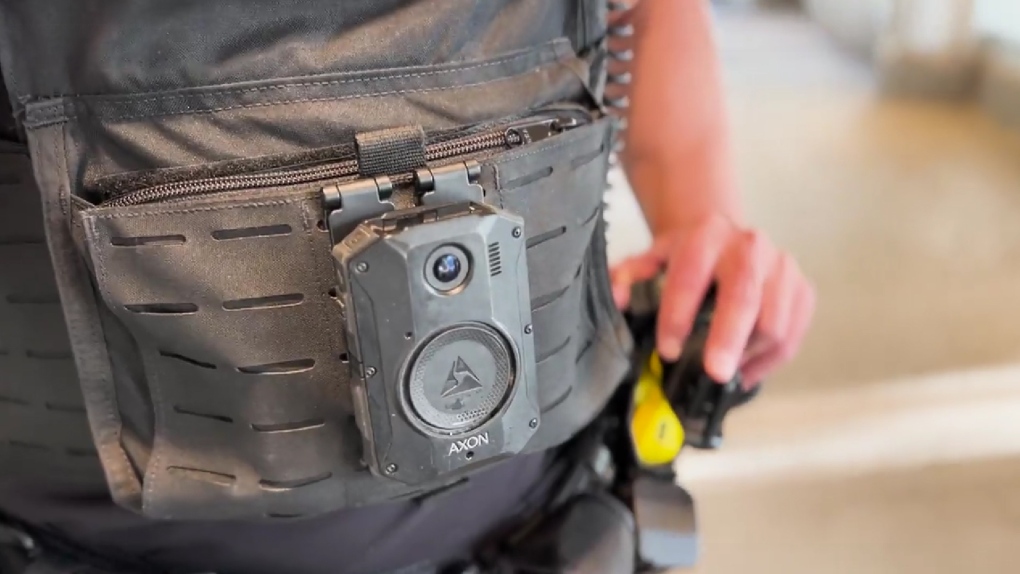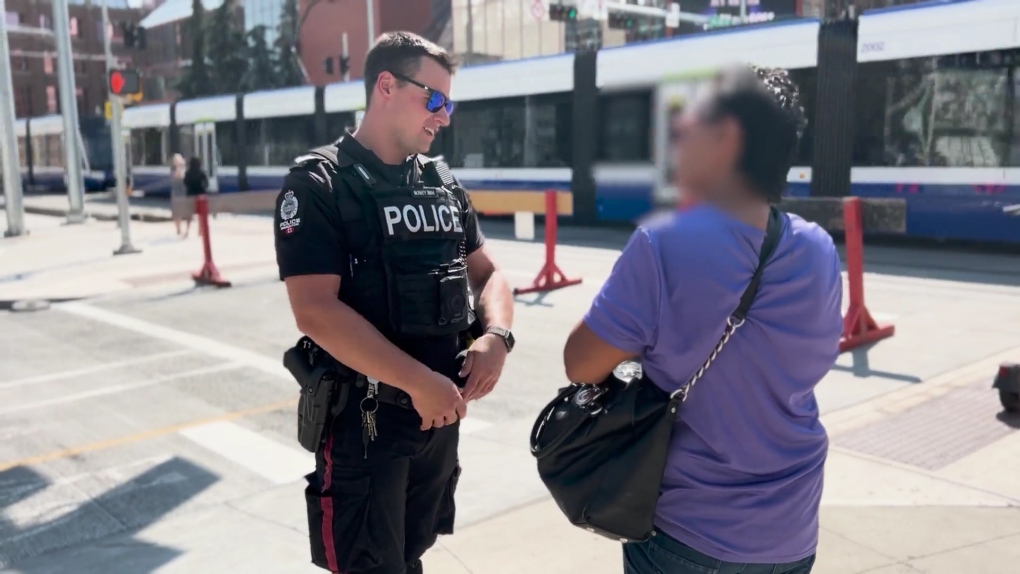Body cameras being issued to all Edmonton police officers in coming months
The Edmonton Police Service (EPS) has started issuing body-worn cameras to its officers as part of a service-wide roll out.
"Body-worn cameras are a helpful tool for everyone when it comes to police interactions," said Deputy Chief Darren Derko with the EPS Community Policing Bureau.
"Wearing the cameras builds trust with the public and it can give valuable insight as an investigative tool," he added.
"It's long overdue," said lawyer Heather Steinke-Attia.
"There are many other jurisdictions which have had them for some time and I believe it is a necessary step towards accountability and transparency," she added.
Edmonton police began testing possible camera options after the provincial government last year directed police agencies across Alberta to work toward adopting body-worn cameras.
Thirty-five officers on the High Risk Encampment Teams, Healthy Streets Operations Centre Community Safety Teams, and Community Safety Teams began wearing the cameras in July 2023.
"During our initial proof of concept period, we found that oftentimes just the presence of the camera can de-escalate situations almost immediately," said Derko.
EPS has since entered a contract with the company Axon for its Body 4 camera.
This week, 280 officers were part of the first phase of rolling out body-worn cameras across the service.
 An Edmonton Police Service officer wearing a body-worn camera. (Credit: Edmonton Police Service)
An Edmonton Police Service officer wearing a body-worn camera. (Credit: Edmonton Police Service)
The first phase will not only include the 35 officers who participated in the 2023 pilot, but also members of the public safety, crime suppression, patrol, Whyte Avenue, gang suppression, commercial vehicle investigation and traffic enforcement teams.
EPS said remaining officers are expected to be issued cameras in the coming year depending on its budget.
What the public can expect
The cameras are about the size of a deck of playing cards and will be mounted on the front of each officer's uniform.
Although not legally required, EPS said its officers will "do their best to advise citizens when they are being recorded."
It is up to the officer to turn on the camera so it records video and audio.
"Once our officers realize that the nature of their interaction is going to be investigated or enforcement in nature or could be one of those two things, that's when they're supposed to be activating their body-worn camera," said Inspector Kurt Martin, EPS Information and Compliance Branch.
"They're encouraged to turn it on every time there's a public interaction, although policing is very dynamic and things can happen really quickly and they may not have even had a chance to turn it on," Derko said.
"I anticipate at some future point, a critical incident where a camera may not have been turned on, or been turned off shortly before and then turned on after an incident and in those circumstances it will of course raise eyebrows and raise questions as to why that occurred," said Steinke-Attia.
According to EPS, there could be disciplinary action if a camera should have been turned on but the officer chose not to.
Even without activation, the body-worn cameras "passively record".
"Now we have the ability to actually physically download that content," said Martin adding "it won't have any sound but it's passively recording."
"There's an unlimited list of circumstances that may result in them not being effective at all times," Steinke-Attia said.
"But I'm confident that at the very least there will be many cases where this could be very helpful for accountability and transparency both in the public's interest but also in the officers interest," she added.
"This will give us the full story of both sides of it," said Derko.
At the end of every shift officers will be required to dock their cameras allowing footage to automatically be uploaded to a secure storage location.
"We're not storing the entire content of an officer's day," said Martin.
"If you were to think about a 12-hour shift and how much video would actually be created, that is a lot of video and a lot of data to manage," he added.
How long recordings are kept depend on the content.
Police said crimes such as thefts or mischief under $5,000 would be kept for 10 years, while video for a homicide file would be kept indefinitely.
All other recordings are stored for a minimum of two years.
Police said it cannot be altered or deleted at any time and the footage logged and given to the Crown prosecutor when charges are laid.
 An Edmonton Police Service officer wearing a body-worn camera. (Credit: Edmonton Police Service)
An Edmonton Police Service officer wearing a body-worn camera. (Credit: Edmonton Police Service)
In addition to increasing transparency and reducing unfounded allegations of police misconduct, EPS hopes the cameras will help increase public trust and confidence in the service.
"That will depend on the public's accessibility to the recorded videos," said Steinke-Attia.
"The police will of course continue to have control over what is disclosed in prosecution investigations, civil lawsuits and when it is disclosed so there's a lot yet to be seen in how the management of the information is going to be handled," she added.
EPS said protocols for releasing video are still being worked out.
The cost of the body-worn camera program is estimated to cost nearly $12 million per year, not including administrative costs for officers to manage their footage.
With files from CTV News Edmonton's Nav Sangha
CTVNews.ca Top Stories

DEVELOPING Driver rams New Year's revellers in New Orleans, killing 10; FBI doesn't believe he acted alone
A driver armed wrought carnage on New Orleans' famed French Quarter early on New Year's Day, killing 10 people as he rammed a pickup truck into a crowd before being shot to death by police, authorities said.
Missing hiker with arrest warrant found after friends delay police report: B.C. RCMP
Mounties in British Columbia are warning the public to be honest after a missing hiker's friends delayed reporting her disappearance to police.
Manhunt underway in Sask. after inmate escapes federal prison
Police are seeking the public's assistance in locating an inmate who escaped from the Saskatchewan Penitentiary in Prince Albert.
Here are some of the new laws and rules coming into effect in Canada in 2025
From boosting child and disability benefits to increasing protections for workers, here’s a look at new measures coming into effect in 2025.
Financial changes in Canada you should know about this year
There are a few changes in federal policies that could affect Canadians' finances in the new year.
FBI finds 150 homemade bombs at Virginia home in one of the largest such seizures, prosecutors say
Federal agents found one of the largest stockpiles of homemade explosives they have ever seized when they arrested a Virginia man on a firearms charge last month, according to a court filing by federal prosecutors.
What we know about a vehicle attack on pedestrians in New Orleans' French Quarter that killed several
Authorities say the driver of a pickup truck sped through a crowd of pedestrians gathered in New Orleans' bustling French Quarter district early on New Year's Day, killing at least 10 people and injuring more than 30 other revelers. The suspect was killed in a shootout with police.
Ford, Acura, Land Rover recall vehicles over safety risks
Certain Ford, Acura and Land Rover models have been recalled in Canada over a variety of issues that pose a risk to drivers’ safety.
With calls for Trudeau's resignation, Poilievre's Conservatives hold 26-point advantage over Liberals: Nanos
Pierre Poilievre's Conservatives are closing out 2024 hitting a new long-term high in ballot support, with a 26 point advantage over the Liberals amid calls for Prime Minister Justin Trudeau to resign.































